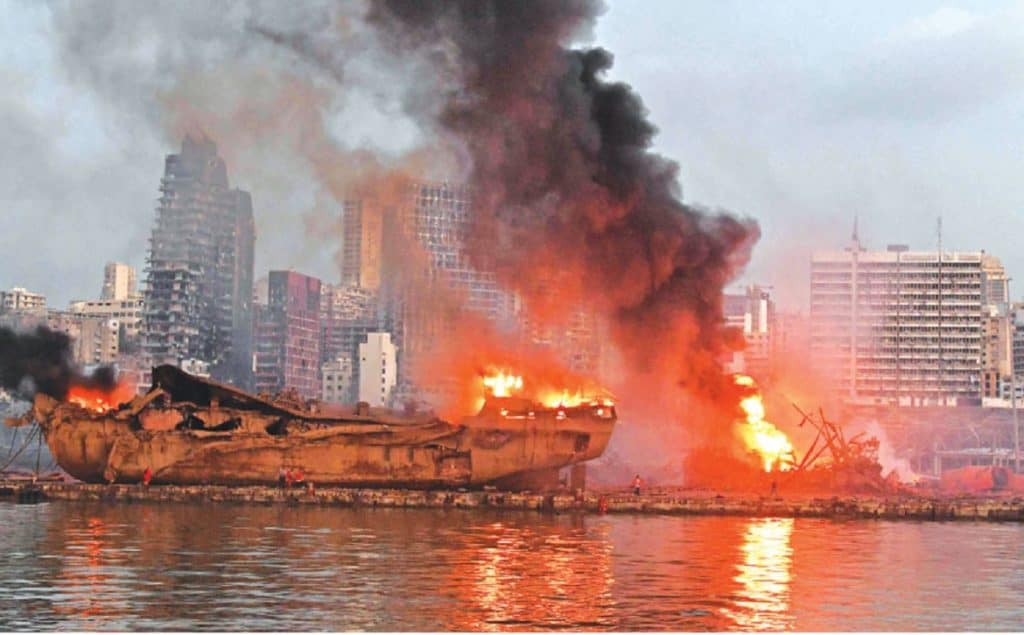By María Isabel Niño-Rada (Professional Specialized in Presidential Counseling for Human Rights and International Affairs)
Lebanon is a country located in Western Asia at the crossroads of the Mediterranean Sea and the Arabian hinterland. With a total area of 10.452 km2, it is the smallest state on the mainland Asian continent.
 This is a land with a rich history and the cradle of the Phoenician ancient civilization, which dates back more than seven thousand years. Later, the region became part of the Roman Empire and in the 16th century was conquered by the Ottomans until World War I, when it was established a French protectorate in the country. Lebanon became an independent state in 1943, while France was being occupied by Germany in World War II.
This is a land with a rich history and the cradle of the Phoenician ancient civilization, which dates back more than seven thousand years. Later, the region became part of the Roman Empire and in the 16th century was conquered by the Ottomans until World War I, when it was established a French protectorate in the country. Lebanon became an independent state in 1943, while France was being occupied by Germany in World War II.
There has been a religious divide between Muslims and Christians in the country that has lasted for centuries. That division, and a Palestinian relocation in Lebanon, led to the Lebanese Civil War (1975–1990) which formed two coalitions: the Christian groups against the joint forces of the Palestinian Liberation Organization- PLO and Muslim militias. Syria invaded the country to intervene on the side of the Christians and Israel sieged Beirut after receiving PLO attacks from Lebanon.
In 1989 was established a ceasefire and a proposal to have an equal ratio of Christian and Muslim officials in the government. The war caused hundreds of thousands of deaths and an enormous damage on property. It devastated the country’s economy, and efforts are still being deployed to rebuild national infrastructure and recover from the political and economic effects of the conflict. Millions of civilians were displaced by the war, some of which never returned, what explains the large Lebanese diaspora around the world.
It is important to note that the war generated the creation of groups as Hezbollah, a powerful political and military organization made up mainly of Shia Muslims that seeks to further an Islamic way of life. It emerged with financed by Iran and struggled to expel Israeli troops from Lebanon.
Hostility to Israel has remained until today, due in large part to the success of Hezbollah’s military arm, the Islamic Resistance. This is one of the Middle East’s most powerful and successful guerrilla organizations, and it increased its influence throughout the years, becoming part of the government. It has several seats in parliament and has ministers in a national unity government. Nonetheless, Washington and the European Union have listed the military wing of Hezbollah as a terrorist organization.
In 2006, Hezbollah launched a series of attacks into Israeli territory, where they killed three Israeli soldiers and kidnapped two others. Israel responded with airstrikes and a ground invasion of southern Lebanon, resulting in the 2006 Lebanon War of 34 days. UN peacekeeping force deployed along the southern border, followed by Lebanese army troops. The conflict was officially ended by the UNSC Resolution 1701 on 14 August 2006, which ordered a ceasefire.
This big background of conflict is vital to understand Lebanon’s current situation, which is undermined by a political and economic crisis. Democracy has been threatened by the extension of the Lebanese parliament term and the impossibility to name a President between 2014 and 2016. Nationwide elections were finally scheduled until 2018. On the other hand, Lebanon has a very high level of public debt and large external financing needs and after 2011 the local economy was affected by the Syrian civil war.
In 2019 and 2020 a number of protests took place in Lebanon. The October Revolution, as this movement is known locally, was triggered by the government’s intention to levy a tax on the WhatsApp messaging app, which was seen as the final straw for people fed up with their politicians.
Other problematics such as the country’s economic stagnation, unemployment, government corruption and failures to provide basic services such as electricity, water and sanitation started to emerge. This situation brought down the government of Saad Hariri, who was succeeded by the academic Hassan Diab.
The protests continued in 2020 and coupled with the coronavirus crisis, which drove half the population into poverty and thousands to famine. Electricity shutdowns are usual and in July power cuts in Beirut reached 20 hours a day last week, up from their usual three. The main covid-19 hospital turned off some air-conditioners and postponed surgeries. Unemployment is above 30% and annual food inflation was 190% at the end of May. The Lebanese pound has shed 80% of its value on the black market. Lebanon has asked for IMF help, but after 16 rounds of talks the two sides are no nearer an agreement.
All of this was happening before a massive explosion shook Lebanon’s capital Beirut on Tuesday evening. The blast was centered on the city’s port area, in the capital of a country that relies in majority on imported food. Homes up to 10 kilometers away were damaged, the explosion generated seismic waves equivalent of a magnitude 3.3 earthquake and it was felt in places as Cyprus. By Thursday, the number of casualties was that at least 137 and 5,000 injured. At least 300,000 people displaced by explosion, Beirut governor said.
The first government reports stated that a major fire broke out in a warehouse used for storing firecrackers. Lebanese Prime Minister Hassan Diab said that an estimated 2,750 tons of ammonium nitrate had been stored at a warehouse in Beirut since 2014, according to a statement published on the Republic of Lebanon Presidency website. The Lebanese cabinet has ordered that “officials” involved in the Beirut port explosion be placed under house arrest “in the coming days,” without providing further details. Human Rights Watch called for an independent investigation into the blast, since the cause of the explosion is still unclear.
A complete breakdown of Lebanon threatens the wider Middle Eastern region, potentially leading to security vacuums that could be exploited by extremists. A total meltdown of the country could also provoke new refugee flows to Europe and add more turmoil to the instability of Syria and Iraq, with negative implications for the region. Given the stakes, the world cannot afford to ignore Lebanon’s situation.
Author: María Isabel Niño Rada (Professional Specialized in Presidential Council for Human Rights and International Affairs; Lawyer and professional in International Relations from the Universidad del Rosario, Colombia; Diploma in International Protection of the Human Rights of Women from the Universidad Austral, Argentina. She is currently enrolled in a Postgraduate degree in Constitutional Law at the Pontificia Universidad Javeriana. Bogotá D.C. Area, Colombia)
(The views expressed in this article belong only to the author and do not necessarily reflect the views of World Geostrategic Insights)
Image Credit: AFP







